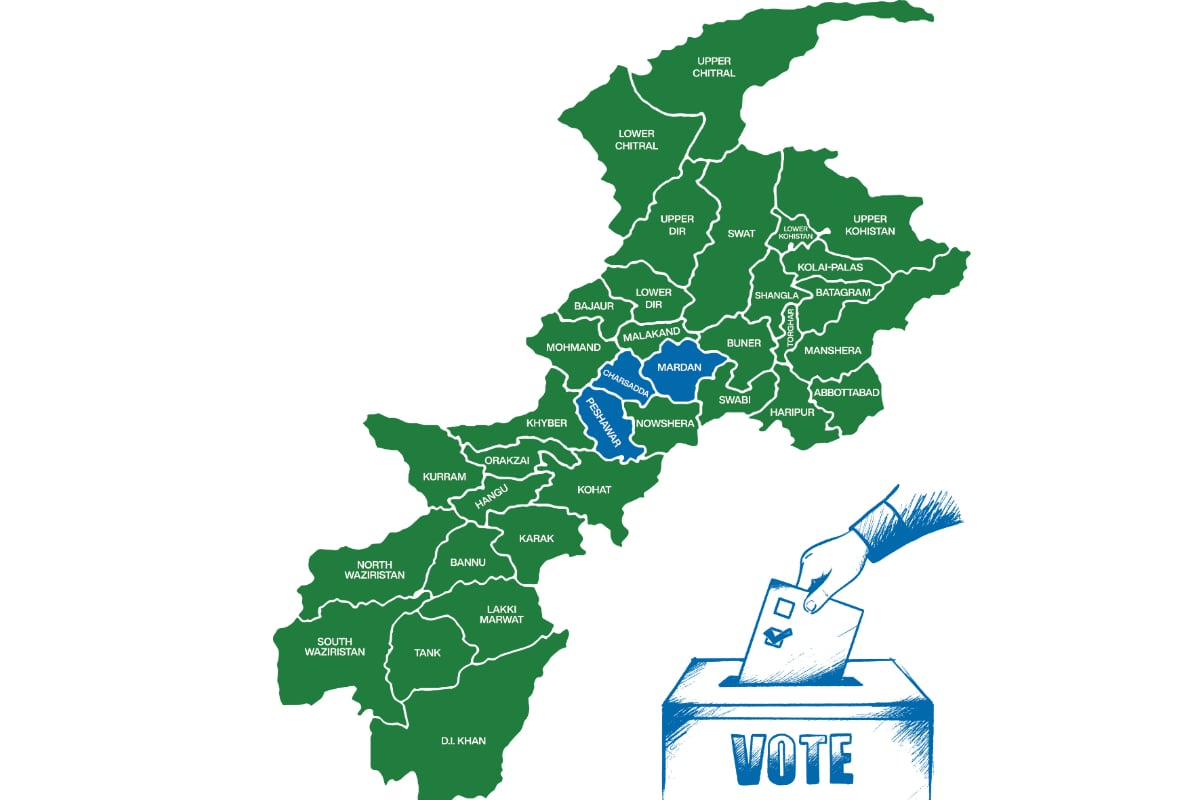PDM’s Humiliating Defeat
-
23rd Oct, 2022. 09:23 am

PDM’s Humiliating Defeat
There are lessons for PDM in KP where Imran Khan single-handedly defeated it on all three by-election seats
Pakistan Tehreek-e-Insaaf (PTI) Chairman Imran Khan made history by winning six out of seven National Assembly seats he contested in Bye-elections on 16 October. Three of those seats were located in the Khyber Pakhtunkhwa (KP) province which has been under the PTI rule for nearly a decade.
Mr Khan’s success comes despite a wider alliance of the country’s major political parties, the Pakistan Democratic Movement (PDM). Significantly, all the seven seats were held by the PTI party, and fell vacant when some of the PTI members of parliament decided to resign following Mr Khan’s ouster from power in a no-confidence vote last April.
His victory also reveals fissures within the PDM alliance, which led to the failure of the alliance leadership to mobilise their voters for participating in elections to their full potential. In most cases, voters of one PDM-allied party were not motivated enough to vote for a PDM candidate fielded in their constituency from another alliance partner.
The KP by-elections were held in three constituencies, namely NA-22 Mardan, NA-24 Charsadda and NA-31 Peshawar. By polls in Kurram District were put off due a law and order situation there.
In Peshawar, Mr Khan secured 57,824 votes while PDM ally Awami National Party (ANP)’s Haji Ghulam Ahmad Bilour got 32,253. In Mardan he polled 76,681 votes against 68,181 of Maulana Muhammad Qasim, a PDM candidate affiliated with Jamiat Ulema-e-Islam-Fazal (JUI-F). In Charsadda, Mr Khan won by getting 78,589 votes against ANP’s provincial President, Aimal Wali Khan, who got 68,356.
Apparently, the PDM’s aim was to score a symbolic victory in KP province. The nationalists within the alliance were hoping to play the nationalist card while parties like the JUI-F were banking on their religious narrative.
Some PTI observers term the results as a litmus test of what is to come in the next general elections. According to them, PDM parties are now worried as to what narrative to build which they will be able to sell to the masses when they face PTI in the next general elections. They say that Khan’s narrative of having been a victim of a foreign conspiracy and his drive against what calls the “corrupt political elite” will push PDM further into a corner.
Independent observers say that while most PDM allies in KP wished to defeat Imran Khan, they also didn’t want to see PDM candidates from their rival groups win, something which helped the PTI in the end. They say the top leaders of the PDM alliance, such as Maulana Fazlur Rahman of JUI-F, Amir Muqam of Pakistan Muslim League Nawaz (PML-N) and Haider Khan Hoti of ANP, did try to build a common PDM narrative, but ideological workers of their respective parties were not much bother.
The defeat of ANP’s Ghulam Ahmed Bilour in his home constituency by a margin of over 25,000 votes is an example, according to observers. It shows that workers of allied groups such as the Pakistan Peoples’ Party (PPP) and the JUI-F in the area did not come out in full force to vote for him on the polling day. Top leaders of the PDM component parties were also missing from Bilour’s pre-polls election campaign. Though many PPP and PML-N leaders, being part of the cabinet, were not allowed to participate in election campaigns, even the PML-N’s Maryam Nawaz failed to show up for Bilour’s campaign despite having promised a visit to Peshawar earlier. Meanwhile, a public gathering in Peshawar’s Qissa Khwani street in support of Bilour, which was to be addressed by the Islamist JUI-F chief, Mualana Fazlur Rehman, was called off reportedly due to differences within the secular-nationalist ANP workers.
Walking through the streets Of Peshawar on the night before elections, one could see what was in the offing. Charged PTI workers were everywhere, including women activists, campaigning till way past the midnight. But there were very few ANP workers in scattered groups, while workers of the PPP and JUI-F were nowhere to be seen.
The ANP’s typical red-caps flooded the party leadership’s home-base of Charsadda, in the streets and around the voting areas. But Aimal Wali Khan still lost, leading many to suspect that once inside the voting booths, even the red-caps ended up stamping the PTI’s bat-and-ball symbol instead of ANP’s lantern.
JUI-F has a considerable support in this Charsadda constituency, and has won it against ANP stalwarts Wali Khan and his son Asfandyar in the past. This time the JUI-F voters were hardly visible on the scene, possibly because Aimal Wali Khan’s ANP party had been their major rival in the region in the past.
Circumstances drifted in the opposite direction in the JUIF’s self-proclaimed stronghold of Mardan, where its candidate, Mulana Qasim, was to take on Imran Khan and a tough fight was expected. But in the end, it appeared that the ANP’s red-caps, who have a big presence in the area, couldn’t bear the sight of a yellow-turbaned JUIF winning the day. Observers say that they mostly stayed away on polling day.
According to observers, the KP youth has mostly drifted towards the PTI due to decades of political rivalries among the major PDM parties in the past. They are also influenced by certain humanitarian and development initiatives taken in their province during the PTI era, such as Imran Khan’s Health Card scheme and Peshawar’s Bus Rapid Transit (BRT) system.
Catch all the Business News, Breaking News Event and Latest News Updates on The BOL News
Download The BOL News App to get the Daily News Update & Live News.